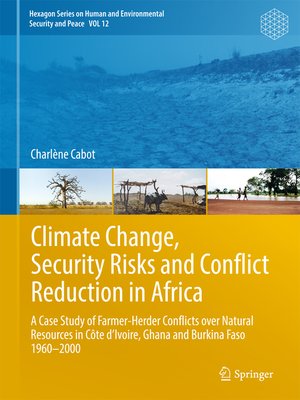Climate Change, Security Risks and Conflict Reduction in Africa
ebook ∣ A Case Study of Farmer-Herder Conflicts over Natural Resources in Côte d'Ivoire, Ghana and Burkina Faso 1960–2000 · Hexagon Series on Human and Environmental Security and Peace
By Charlène Cabot

Sign up to save your library
With an OverDrive account, you can save your favorite libraries for at-a-glance information about availability. Find out more about OverDrive accounts.
Find this title in Libby, the library reading app by OverDrive.



Search for a digital library with this title
Title found at these libraries:
| Library Name | Distance |
|---|---|
| Loading... |
Millions
of people are already affected by weather-related shocks every year in West
Africa and climate change is highly likely to increase these threats. In the
wake of climate change, rising temperatures, increasingly irregular rainfall
and more frequent natural hazards will endanger the ways of life of vulnerable
population groups in this region and destabilize their human security. A surge
in violence and conflicts could take place. One of the conflict constellations
could be between farmers and herders. These groups are highly vulnerable to
climate change due to their dependence on natural resources Millions of people are already affected by weather-related shocks every year in West Africa and climate change is highly likely to increase these threats. In the wake of climate change, rising temperatures, increasingly irregular rainfall and more frequent natural hazards will endanger the ways of life of vulnerable population groups in this region and destabilize their human security.A surge in violence and conflicts could take place. One of the conflict constellations could be between farmers and herders. These groups are highly vulnerable to climate change due to their dependence on natural resources for their subsistence. Furthermore, they are historically prone to enter into conflict over issues of access to natural resources. However, social, economic and political circumstances fundamentally influence environmental conflicts. There might thus be opportunities to face the societal challenges of climate change in a peaceful way and the political and institutional framework could play an important role in reducing conflict and violence. In order to explore such a path, this study analyses the potential of political factors (policies and institutions) for the reduction of climate-change-induced or aggravated conflicts between farmers and herders. After a theoretical demonstration, a case study of agro-pastoral conflicts in Burkina Faso, Côte d'Ivoire, andGhana is conducted. their
subsistence. Furthermore, they are historically prone to enter into conflict
over issues of access to natural resources. However, social, economic and
political circumstances fundamentally influence environmental conflicts. There
might thus be opportunities to face the societal challenges of climate change
in a peaceful way and the political and institutional framework could play an
important role in reducing conflict and violence. In order to explore such a
path, this study analyses the potential of political factors (policies and institutions)
for the reduction of climate-change-induced or ‑aggravated conflicts between
farmers and herders. After a theoretical demonstration, a case study of
agro-pastoral conflicts in Burkina Faso, Côte d'Ivoire, and Ghana is conducted.






